The 15 Best Dog Breeds for Pet-Friendly Workplaces
Boost morale and reduce stress with a dog in the office. These breeds are up for the job.
Boost morale and reduce stress with a dog in the office. These breeds are up for the job.
by Katie Koschalk, | January 3, 2025

mixetto / iStock
Pet-friendly workplaces are on the rise, and it’s easy to see why. Having a dog around has been shown to lift spirits, ease stress, and foster a more welcoming and collaborative atmosphere. However, not every dog is built for office life, and not every office is suited to having a canine colleague.
If you’ve considered getting a dog but worry about finding one who will fit well in your dog-friendly workplace, consider visiting a shelter or rescue. There, you can meet a variety of dogs, observe their personalities, and ask the staff questions to find the best match.
But before heading to the shelter, check out this list of breeds (and mixes) who often make great office companions. It’ll give you a clearer idea of what to look for when finding your perfect workplace buddy.
Not every dog would do well in an office setting, so it’s important to know what qualities to look for when choosing your canine coworker. Here are some traits that can make a dog a great fit for a pet-friendly workplace.
Calm and adaptable temperament: Office dogs should be laid-back and able to adapt to different environments and people. Dogs who are easily stressed or overly energetic may struggle in a busy office setting.
Friendly and sociable: A good office dog gets along well with strangers and other dogs. They should enjoy being around people without becoming too excited or demanding.
Well-trained or trainable: Dogs who already know basic commands like “sit,” “stay,” and “down” are easier to manage in an office. If not fully trained, they should at least be eager to learn and responsive to positive reinforcement training.
Quiet and non-destructive: Barking or chewing on office furniture can disrupt the workplace (and cost money). Look for dogs who are naturally quiet and well-behaved indoors.
Comfortable being alone: Office dogs may need to stay in a designated space or crate while their pet parent is in a meeting or focused on work. Dogs who can relax on their own and be away from their human for periods of time are a better fit for these situations.
Size and physical needs: Smaller or medium-sized dogs may be more manageable in tighter office spaces. Also, consider how much exercise the dog will need during the workday and if the environment and your work schedule environment can accommodate that.
Ivan Petersel, certified professional dog trainer and founder of Dog Wizardry, says that every dog is unique (even within the same breed), so it’s important to evaluate the temperament and energy level of the individual dog. That said, some breeds are characterized by a calm demeanor and for their adaptability and trainability, which can make them better suited for office life.
Here are 15 dog breeds and mixes who often make excellent work companions.

Alex Master / AdobeStock
Petersel says Cavalier King Charles Spaniels are one of the most affectionate breeds you’ll ever meet and perfect for an office environment. He highlights their easygoing nature, intelligence, and ability to adapt to new surroundings. These small dogs enjoy being near people and are generally content to spend the day lounging by your desk and accompanying you on quick outings. Their gentle disposition makes them a hit with coworkers and clients alike.

Eva Blanco / AdobeStock
Golden Retrievers, a medium-sized breed typically weighing over 50 pounds, can do well in offices with enough space. They’re friendly, eager to please, and quick learners, making them easy to train for proper office etiquette. Their calm, adaptable nature allows them to thrive in a variety of workplace settings, and their goofy smiles are sure to bring stress relief and joy to everyone around them.

SeventyFour Images / Alamy Stock Photo
Shih Tzus are perfect for office life due to their compact size and relaxed demeanor. They’re not overly demanding and are usually content to nap at your feet or sit quietly nearby. Their friendly and approachable nature makes them a welcome presence for coworkers.

Marija Kovac / Stocksy
Poodles are (mostly) hypoallergenic, making them a popular choice for allergy-conscious workplaces. Their highly intelligent and adaptable nature allows them to thrive in a variety of office environments and schedules. They’re also quick learners, making training for office etiquette a breeze. While Standard Poodles are better suited for larger offices with more space to move around, Toy and Miniature Poodles do well in smaller spaces.

valbar STUDIO / Stocksy
If your office has the space for one of these medium-to-large dogs (weighing 55 to 80 pounds), a Labrador Retriever could be the perfect new coworker. Known for their loyal and friendly nature, Labs bring warmth and positivity wherever they go. Their adaptability and eagerness to learn make them well-suited for busier or more relaxed office settings. A well-matched Lab will seamlessly settle in and win everyone over.

Branko Starcevic / Stocksy
Bichon Frises are another more-or-less hypoallergenic breed. They’re cheerful and love attention but aren’t overly demanding. Plus, their low-shedding coat helps keep the office neat. Despite their small size, Bichons are packed with personality and are guaranteed to bring smiles to everyone in the office.

Volker Thimm / Pexels
Pugs love being around people, and their small stature makes them easy to manage in smaller office spaces. They’re likely to charm your coworkers and enjoy the company of new friends. Pugs are not overly active and are happy to nap for hours as long as they feel close to their favorite human. While Pugs may occasionally snort or snore (due to their flat faces), they’re generally not excessive barkers.

New Africa / Shutterstock
Cocker Spaniels are known for being friendly, adaptable, and lively. They’re often called the “merry cocker” because of their happy demeanor and constant wagging tail. They enjoy being around people and love to please, so training is usually relatively easy. This breed tends to be just as happy lounging at your feet as they are joining you for a walk during your lunch break.

Alie Lengyelova / Stocksy
Whippets are calm, quiet, and happiest when nestled in a cozy spot, like under your desk. Known for their reserved nature, they rarely bark unnecessarily, helping maintain a peaceful workplace. Between bursts of exercise, Whippets love to stretch out and relax for long hours, often curling up for a nap at your feet.
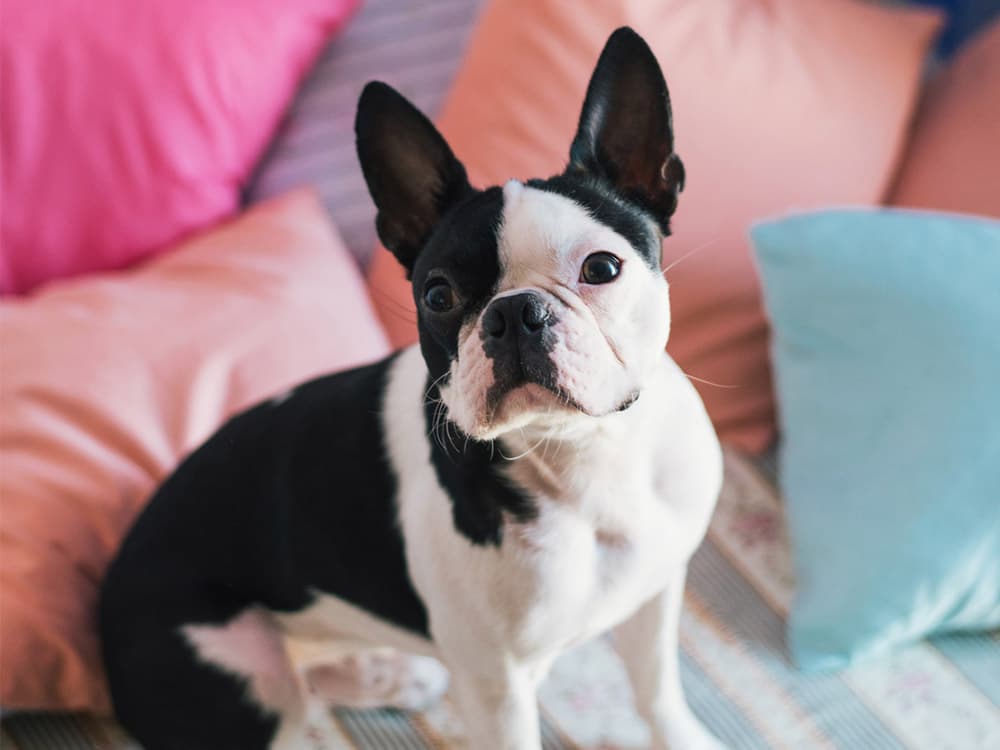
Aleksandra Jankovic / Stocksy
The Boston Terrier’s impeccable manners have earned them the nickname the “American Gentleman.” This breed is friendly, adaptable, and relatively low-maintenance. They’re social dogs who enjoy human interaction but are also content relaxing when you’re busy. Their small size and quiet, gentle demeanor make them great office companions.
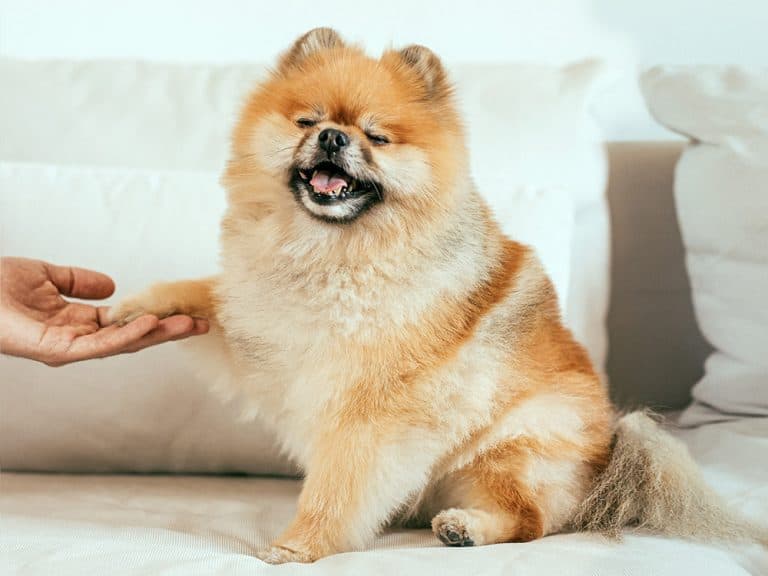
Cup of Couple / Pexels
Pomeranians may be small (no more than seven pounds), but they pack a big personality into their compact frame. These dogs thrive on social interaction and enjoy being the center of attention — perfect for workplaces with a lot of human contact. Their exercise needs are relatively low, although they need short walks during breaks.

Tsuguliev / Shutterstock
Curious, friendly, and full of spunk, Dachshunds add a unique charm to the office without being overwhelming. Their small size makes them easy to manage in smaller spaces, and their independent side means they can keep themselves entertained with toys or simply observe the office buzz.

Irina Efremova / Stocksy
These compact dogs bring a cheerful presence to the workplace with their friendly, outgoing demeanor and charming personality. Although Westies are typically quiet, they might give a quick bark to announce new visitors. They handle downtime well, enjoy socializing with people and other dogs, and have the added benefit of being low-shedding.
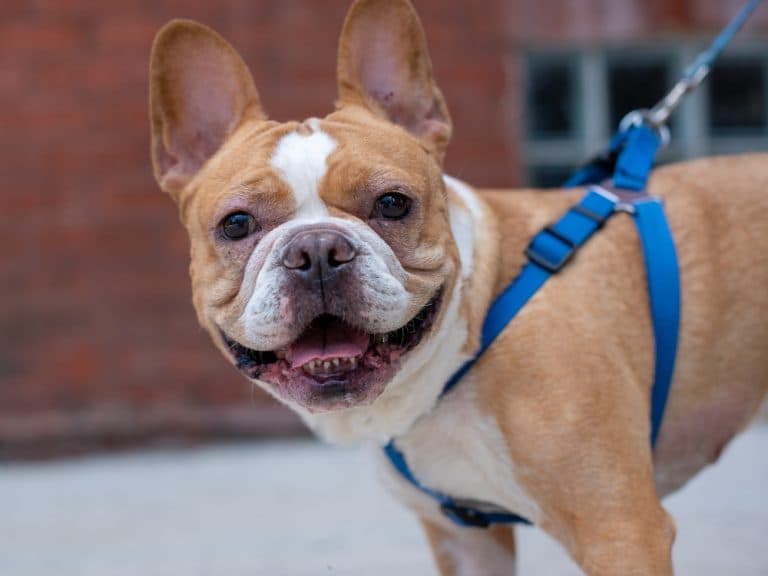
Page Light Studios / Adobe Stock
French Bulldogs are compact and easygoing, often happy to nap while you work. They’re incredibly social and love interacting with people but are relatively low-energy. Plus, their minimal barking keeps the office atmosphere calm.

LiudmylaSupynska / iStock
Don’t overlook mixed breeds — these dogs can bring the best of multiple traits. Shelters and rescues are full of incredible and smart mixed-breed dogs, each with distinct personalities and characteristics. By visiting a shelter, you’ll have the opportunity to meet a variety of dogs and learn more about their temperaments, behaviors, and needs. The knowledgeable staff can help match you with a dog whose personality aligns with your workplace environment. Plus, adopting a shelter dog gives a deserving pup a second chance.
You can also explore Adopt a Pet’s database to search for adoptable dogs near you.
Introducing a dog to your workplace can boost morale and create a more positive environment, but it’s important to consider several factors to ensure a harmonious experience for everyone involved.
Before bringing a dog to the office, review your workplace’s pet policy and get approval from your supervisor. Some offices have specific guidelines about the types of pets allowed, where they can roam, and how they should be supervised. It’s also important to understand liability policies in case of accidents, such as injuries or property damage.
Not everyone in the office may be comfortable around dogs. Allergies, phobias, or personal preferences need to be respected to maintain a positive work environment. Consider polling your team to understand their comfort levels with having a dog in the office.
If your workplace frequently hosts client visits, consider how a dog’s presence might affect these interactions. While some clients may enjoy the welcoming and relaxed atmosphere a dog brings, others might prefer a more conventional, pet-free environment. To avoid distractions during meetings, set up a designated space for your dog away from client areas.
Petersel says coworkers should avoid being overly excited when a dog enters the office, as this can overstimulate the dog. “It also creates an association that the office is an exciting place instead of a relaxing environment,” he adds. Petersel says there can be exciting moments, but overall, the office should represent a calm place.
Reward your dog with treats and praise when they settle down. This teaches them that good things happen when they’re calm.
Have supplies like baby gates, crates, or leashes on hand to keep your dog contained, if needed.
Make sure your dog is clean, up-to-date on vaccinations, and free from fleas or other health concerns.
Keep treats, toys, and waste bags handy to use as needed throughout the day.
While bringing your dog to the office can be a fun experience, remember that their needs extend beyond simply being by your side. Petersel says that all dogs, including those in a workplace setting, require physical and psychological stimulation to stay happy and healthy.
Office life can be sedentary, so ensuring your dog gets plenty of physical activity throughout the day is crucial. This entails taking them for a walk before work, during breaks, and after you get off work. If you don’t have time during your work day to walk your dog, Petersel suggests hiring a dog walker.
Providing opportunities for exercise helps the dog burn off energy, supports their health, and prevents restlessness and boredom in the office.
Keeping your dog mentally engaged is just as important as meeting their physical needs. Bring along puzzle toys, treat-dispensing games, or chew toys to keep them occupied while you’re working, Petersel suggests. “Don’t leave a bunch of puzzles on the floor, though — it’s best to take them away before your dog gets bored, which builds engagement for the next time they’re presented,” he adds.
Quick training sessions during breaks can also be a great way to reinforce good behavior and challenge their minds.
Dogs thrive on routine, so establish a consistent schedule for potty breaks, walks, and playtime. Additionally, create a comfortable space in the office where your dog can relax, such as a cozy bed beside your desk. Having a familiar, secure spot can help them feel more at ease.
Your dog’s age plays a significant role in how well they’ll adapt to office life. Puppies require frequent potty breaks, socialization, and training, which can be time-intensive. Their energy levels are high, and they may have shorter attention spans, making it challenging to focus on work.
Middle-aged dogs are often the best-suited age group for an office environment. By this stage, they’re typically house-trained and have settled into their personalities. They’re also better at self-regulating their energy levels, making it easier for them to relax by your side during work hours.
Senior dogs can also make wonderful office companions due to their calm demeanor and lower energy levels. They’re often content to nap by your desk and require fewer walks than younger dogs. However, be mindful of any challenges they have, such as issues with mobility.
Not every dog is suited for office life. A good office dog should be calm, friendly, well-trained, and comfortable around people and other dogs. Consider your dog’s temperament and energy level before bringing them to work.
Not all Golden Retrievers are suited for work environments. While some are friendly, calm, and adaptable, others may be too hyper or wary of strangers. Always consider the individual dog, regardless of breed.
Secure cords, keep trash cans inaccessible, and remove access to potentially harmful items such as cleaning supplies or small objects.
Bring their favorite toys and a cozy bed to create a sense of security. Provide plenty of breaks for exercise and mental stimulation. If possible, ease them into office life by gradually increasing their time there until they’re comfortable staying all day.
Wagner, Elisa, and Miguel Pina e Cunha. “Dogs at the Workplace: A Multiple Case Study.” Animals, vol. 11, no. 1, 5 Jan. 2021, p. 89, https://doi.org/10.3390/ani11010089. Accessed 26 Apr. 2021.
Wein, Harrison. “The Power of Pets.” NIH News in Health, National Institute of Health, Feb. 2018, newsinhealth.nih.gov/2018/02/power-pets.
“Workplace Wellness.” HABRI, habri.org/research/mental-health/workplace-wellness/.

Katie Koschalk is a freelance writer based in Northern California. Fusing her love and knowledge of animals with her journalism degree and years of professional writing, Katie is dedicated to improving the lives of pets and their caretakers by sharing helpful and accurate information. When she’s not at her desk, you can find her exploring trails with her Aussie, Hunter, cooking plant-based meals, and talking to her two cats, Jax and Sadie, in really ridiculous voices.
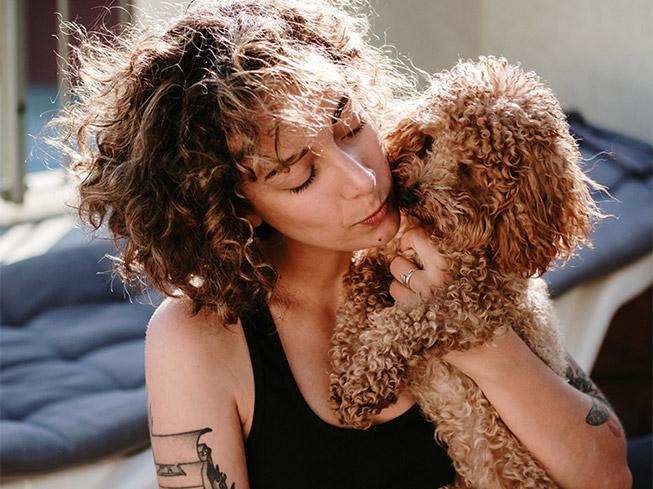
Breed Info
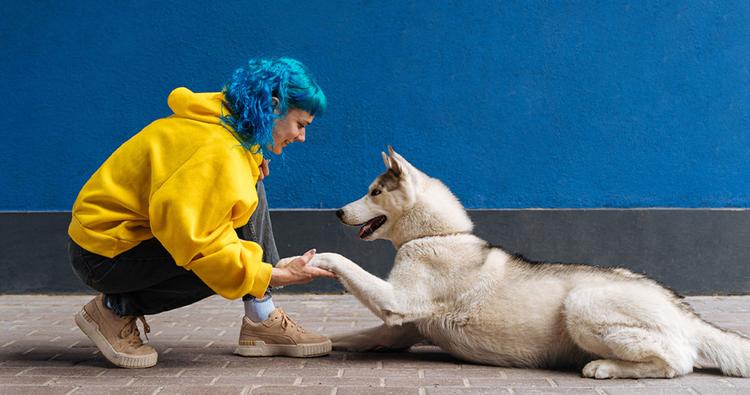
Breed Info

Breed Info

Breed Info
Guessing a dog’s breed mix often leads to inaccurate labels. Here’s how to more precisely determine your dog’s genetic makeup.


Breed Info
Are you an extroverted pet-parent-in-the-making looking for a loveable, outgoing pup? Scroll down to meet the friendliest dog breeds who’ll make your life that much more enriching.
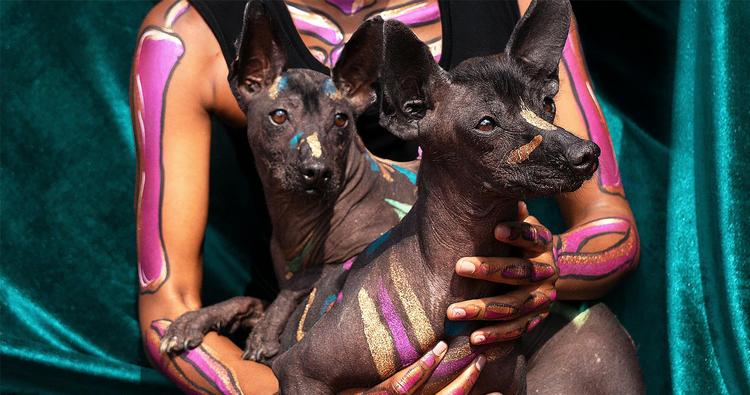
Breed Info
These pups may not have any fur, but they sure know how to rock it.

Breed Info
One of the joys of adopting a dog is sinking your hands into their fluff, and it
